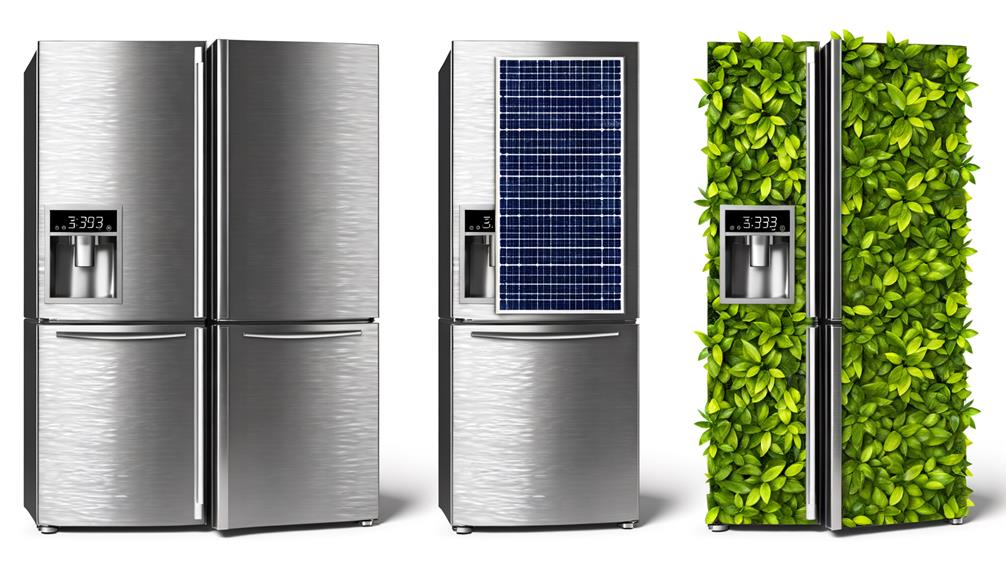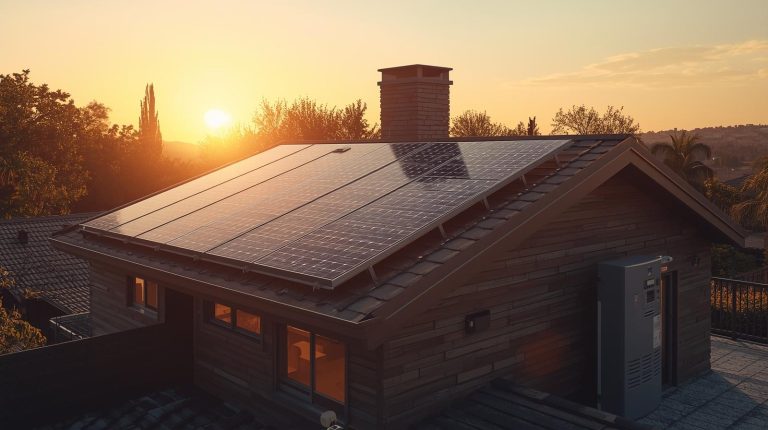If you’re hunting for the most energy-efficient refrigerator of 2024, you’re in luck with models like the BLACK+DECKER Compact Refrigerator 1.7 Cubic Feet and the Hamilton Beach Full Size Refrigerator leading the charge. Their low consumption rates and enhanced features, like adjustable temperature controls and ultra-quiet operations, make them top picks.
Also notable are the Emerson Compact Refrigerator and the Upgraded Mini Fridge for bedrooms, both boasting ENERGY STAR ratings and eco-friendly components ensuring minimal environmental impact. And don’t overlook the Double Door Mini Fridge, offering flexibility with its dual cooling sections. Exploring these options further could reveal just the right fridge for your needs.
Key Takeaways
- BLACK+DECKER BCRK17B: Ultra-quiet, energy-efficient at 70 watts, with adjustable temperature and reversible door.
- Hamilton Beach HBF1558: Features a digital display, quiet operation, and energy-efficient design with 15.6 cubic feet capacity.
- Upgraded Mini Fridge for Bedroom: Budget-friendly, low noise level at 38 dB, with five temperature settings and a dedicated freezer section.
- Emerson 1.6 Cu. Ft. Compact Refrigerator: ENERGY STAR certified, offers precise temperature control and a reversible door for flexible installation.
- 3.5 Cu.Ft Mini Fridge with Freezer: Offers seven temperature settings, energy-efficient at 0.48 kWh per day, and operates quietly at 36 decibels.
BLACK+DECKER Compact Refrigerator 1.7 Cubic Feet (BCRK17B)
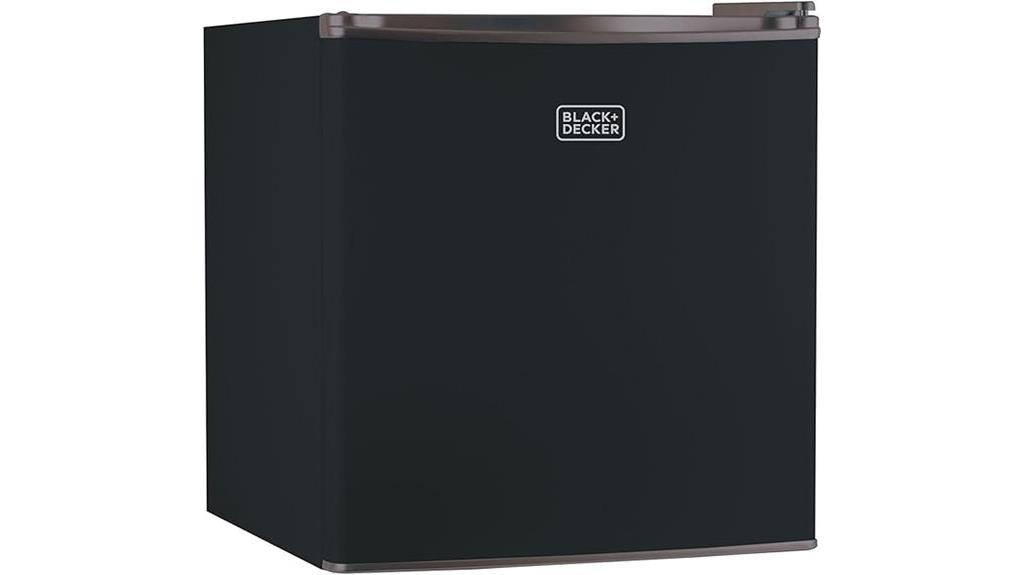
If you’re seeking an energy-efficient solution for compact spaces, the BLACK+DECKER Compact Refrigerator 1.7 Cubic Feet (BCRK17B) is an ideal choice. It consumes only 70 watts, making it a top pick for saving on your energy bills. The adjustable temperature control guarantees your food and drinks stay chilled, even at the lowest setting of 33.8°F. Plus, it’s designed to fit neatly on counters or floors, maximizing your space without sacrificing functionality.
You’ll appreciate the reversible door and leveling legs that add to its convenience, perfect for any small room or office. Despite its compact size, it features a removable glass shelf and smart storage for cans, bottles, and more. And it’s ultra-quiet, so you won’t be disturbed by loud humming or buzzing.
Best For: Small spaces such as dorm rooms, offices, or apartments where compact and efficient refrigeration is needed.
Pros:
- Energy-efficient, consuming only 70 watts
- Ultra-quiet operation ideal for environments where noise is a concern
- Adjustable temperature control and convenient reversible door
Cons:
- Freezer compartment not suitable for long-term freezing
- Some reports of units arriving with minor cosmetic imperfections
- Limited service support in certain regions like India
Hamilton Beach Full Size Refrigerator (HBF1558)
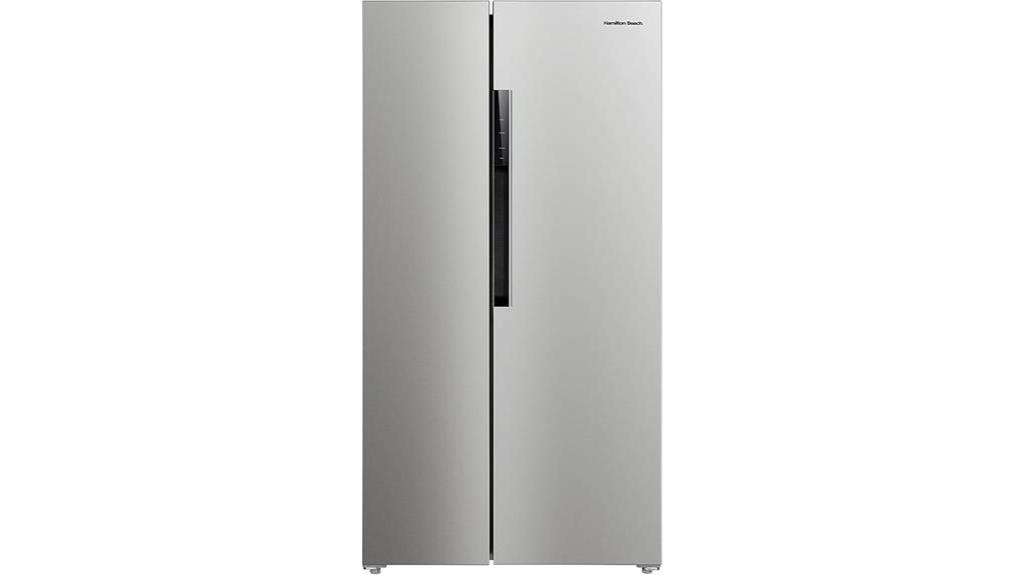
You’ll appreciate the Hamilton Beach Full Size Refrigerator (HBF1558) for its energy efficiency and space-saving design, making it ideal for smaller kitchens or areas where space is at a premium. This model features a counter-depth build and side-by-side French doors, offering a generous 15.6 cubic feet of space.
The adjustable shelves and oversized door bins accommodate everything from gallon-size beverages to varied food items, allowing for personalized storage. The digital display simplifies setting adjustments, while the built-in lamp enhances visibility, making it easier to find what you need quickly.
Although some users desire more compartments and shelving, the overall feedback praises its functionality, quiet operation, and sleek design. Plus, it comes with handy delivery options and a solid warranty for peace of mind.
Best For: Small kitchens or spaces where maximizing storage and efficiency is crucial.
Pros:
- Energy-efficient with a counter-depth design that fits well in small areas.
- Features adjustable shelves and oversized door bins for versatile storage options.
- Quiet operation paired with a sleek aesthetic and digital display for ease of use.
Cons:
- Limited compartments and shelving in the freezer section as per user feedback.
- Some users desire actual temperature readings for better control.
- Additional organizers may be necessary to fully maximize space.
Upgraded Mini Fridge for Bedroom (3.2 Cu.Ft, Black)
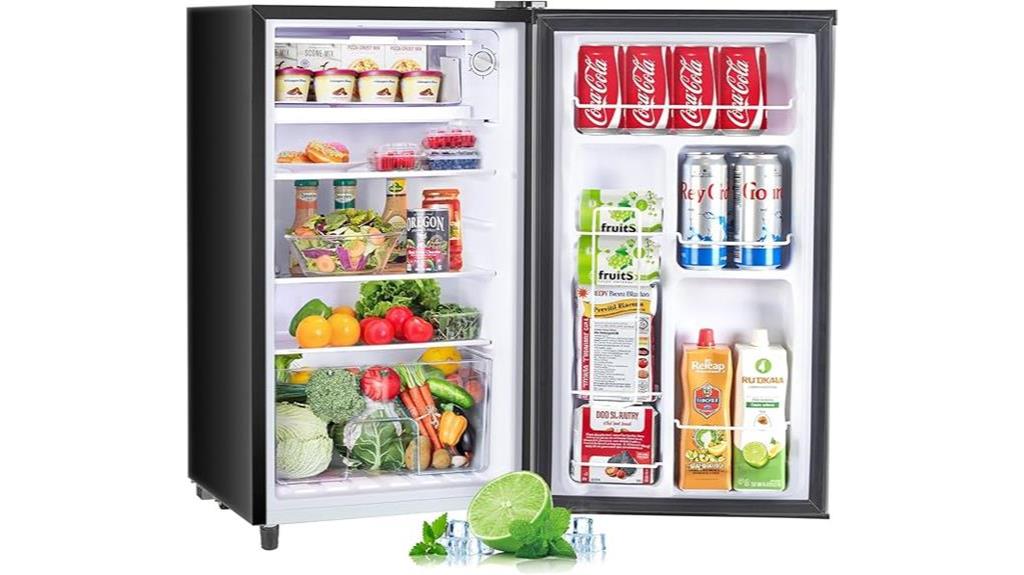
For those seeking a compact yet powerful cooling solution, the Upgraded Mini Fridge for Bedroom (3.2 Cu.Ft, Black) stands out in the 2024 lineup of energy-efficient refrigerators. It’s perfect if you’re tight on space but don’t want to skimp on quality. With dimensions that neatly fit into snug corners, this fridge offers a total storage capacity of 3.2 cubic feet. You’ll find a dedicated freezer section and a refrigeration area that’s ideal for keeping your drinks chilled and snacks fresh.
It features five adjustable temperature settings, ensuring your groceries are stored just right. Plus, it operates quietly at 38 dB, so it won’t disturb your sleep or studies. You’ll appreciate its low energy usage, costing roughly $0.41 per day, making it a wallet-friendly option for energy-conscious consumers.
Best For: Students and professionals living in small spaces who need a quiet, energy-efficient refrigeration solution.
Pros:
- Compact design fits easily in small rooms or apartments.
- Five adjustable temperature settings for versatile storage options.
- Low noise level ideal for quiet environments like bedrooms and offices.
Cons:
- Limited freezer space may not suffice for those requiring more freezing capacity.
- Only available in black, which might not suit all decor styles.
- Energy cost, while low, can accumulate over time for budget-conscious users.
Emerson 1.6 Cu. Ft. Compact Refrigerator (White)
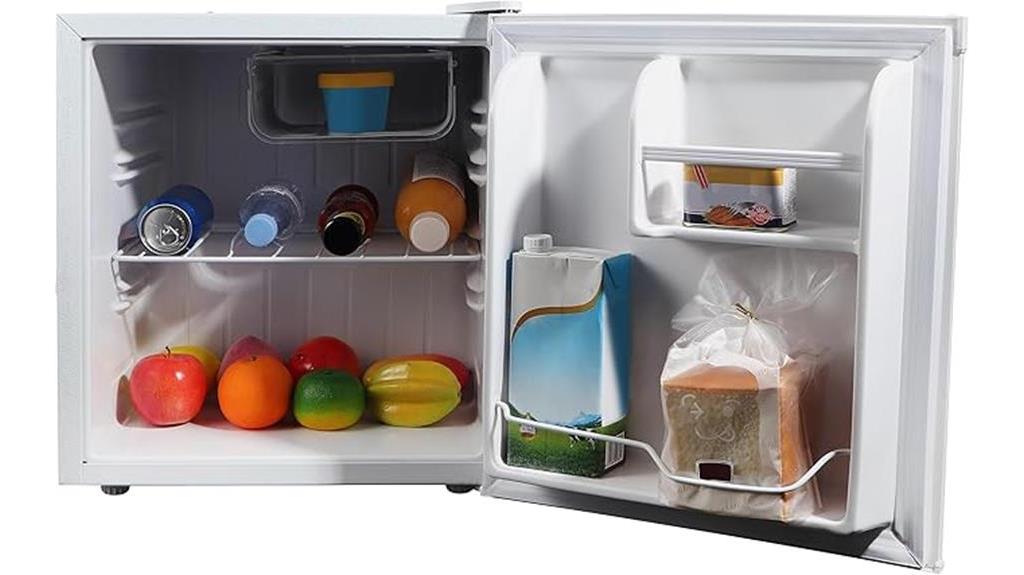
Often overlooked, the Emerson 1.6 Cu. Ft. Compact Refrigerator is a gem for those in need of a compact, energy-efficient cooling solution. It’s ENERGY STAR qualified, ensuring you save on energy bills while being kind to the environment. You’ll find its 1.6 cubic feet interior surprisingly spacious, perfect for stashing your snacks, beverages, and fresh produce. The sleek white design not only looks great but enhances any room’s decor, be it a dorm, office, or RV.
Its mechanical temperature control lets you adjust the cooling precisely, and the separate chiller compartment is a handy addition for extra storage. Plus, the reversible door design and adjustable legs mean you can fit this fridge just about anywhere. Despite some concerns over can storage and a few hiccups post-purchase, most users rave about its quiet operation and efficient performance. Remember, it comes with a 30-day return guarantee from Amazon, and a manufacturer’s warranty can be requested for added peace of mind.
Best For: Small living spaces, dorm rooms, and personal office use where compact and efficient refrigeration is needed.
Pros:
- ENERGY STAR qualification ensures energy efficiency and eco-friendliness.
- Features mechanical temperature control with adjustable thermostat for precise cooling.
- Includes a separate chiller compartment and reversible door for versatile storage and placement.
Cons:
- Some users report difficulty in storing 12 oz cans due to door design.
- Occasional complaints about malfunctions occurring shortly after the 30-day return period.
- Manual defrost feature may require additional maintenance effort.
3.5 Cu.Ft Mini Fridge with Freezer, Double Door (Black)
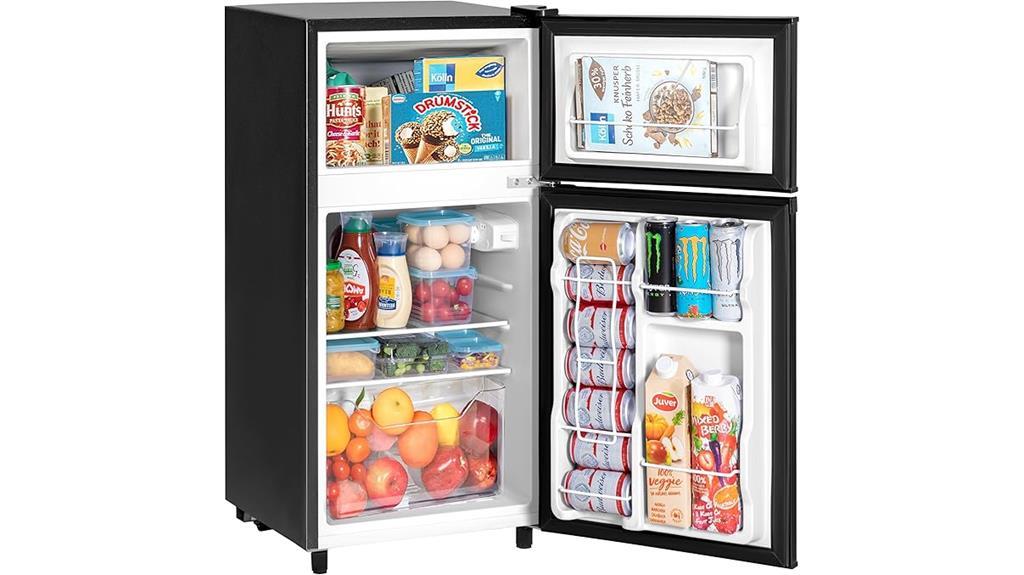
If you’re seeking a compact yet powerful fridge, the Tehanld 3.5 Cu.Ft Mini Fridge with its double-door design is an ideal match. Occupying only 2.21 sq.ft, it fits neatly into small spaces while offering a generous 1 Cu.Ft freezer and a 2.5 Cu.Ft refrigeration compartment. The double doors prevent odor transfer and contamination, keeping your food fresh and tasty.
You’ll love the flexibility of the seven temperature settings, ranging from 32°F in the fridge to -0.4°F in the freezer, perfect for everything from ice cream to fresh produce. With an energy cost of just 0.48 kWh per day and a whisper-quiet operation at 36 decibels, it’s both efficient and unobtrusive. Plus, it’s equipped with handy features like rear wheels, an LED light, and a heat compensation button for enhanced winter efficiency.
Best For: Small offices, dorm rooms, or compact living spaces seeking a quiet, energy-efficient refrigeration solution.
Pros:
- Dual-door design minimizes odor transfer and contamination.
- Low energy consumption at only 0.48 kWh per day.
- Features like LED lighting, rear wheels, and a heat compensation button add convenience and efficiency.
Cons:
- Limited freezer space may not be suitable for large frozen food storage.
- Requires 6-12 hours of upright positioning before first use which may delay immediate operation.
- Only available in black, which may not suit all decor preferences.
Factors to Consider When Choosing the Most Energy Efficient Refrigerator
When you’re on the hunt for the most energy-efficient refrigerator, it’s essential to take into account several key factors. Pay attention to energy consumption rates and annual operating costs, as these directly impact your utility bills and environmental footprint. Additionally, look for efficient design features, temperature control efficiency, and eco-friendly components to guarantee you’re making a sustainable choice.
Energy Consumption Rates
Considering energy consumption rates is essential when selecting the most energy-efficient refrigerator. These rates are typically measured in kilowatt-hours (kWh) per year, and the most efficient models consume less than 300 kWh annually. You’ll find that ENERGY STAR certified refrigerators are at least 9% more energy-efficient than their non-certified counterparts. This certification not only aids in reducing environmental impact but also leads to significant cost savings in the long run.
On average, the yearly energy cost of running a refrigerator ranges from $30 to $100, highly dependent on the model’s efficiency and how often you use it. Compact refrigerators, for instance, generally consume less energy than full-size models, with some consuming below 70 watts. This makes them an ideal choice if you’re looking to save on energy bills and don’t require large storage space.
Moreover, where you place your refrigerator can impact its energy consumption. Keeping it away from heat sources and minimizing door openings can help reduce the amount it needs to work, thereby conserving energy. Always consider these aspects to guarantee you choose the most energy-efficient model that suits your needs and usage patterns.
Efficient Design Features
To maximize energy efficiency in your kitchen, choosing a refrigerator with specific design features is vital. First off, you’ll want to look for an ENERGY STAR certification. This label means the fridge meets stringent guidelines set by the U.S. EPA and typically uses 15% less energy than models without certification. It’s a reliable indicator that you’re picking a top performer in energy efficiency.
You should also consider models with adjustable thermostats. This feature allows you to set precise temperatures for different types of food, which can help cut down on energy use. Remember, not all areas of your fridge need to be the same coldness, and tailoring the temperature can reduce unnecessary cooling.
Another smart choice is opting for compact designs or models with space-saving features. Smaller refrigerators use less energy, particularly useful if you don’t need a large capacity. Furthermore, make sure your choice has effective insulation and door seals. These are vital for minimizing energy loss and keeping the internal temperature stable without overworking the system.
Lastly, choose a unit with LED lighting. LEDs use less energy and emit less heat than traditional bulbs, which helps keep your fridge’s interior cooler and more efficient.
Annual Operating Costs
Understanding the annual operating costs of refrigerators is essential when selecting the most energy-efficient model for your home. These costs are primarily determined by the unit’s energy consumption, usually measured in kilowatt-hours (kWh). ENERGY STAR-rated refrigerators often come out on top, costing less to operate due to their lower energy usage. For instance, a fridge using 400 kWh annually at an average electricity rate of $0.13 per kWh would cost about $52 each year.
You’ll find that energy-efficient models typically use less power, many running on 70 watts or less. This lower wattage translates directly into savings on your electricity bills over time. However, don’t overlook the size and capacity of the refrigerator. Bigger units tend to consume more energy, which could bump up your operating costs.
Moreover, keeping up with regular maintenance is important. Simple actions like cleaning the coils and checking the door seals can enhance energy efficiency, further reducing annual expenses. So, it’s not just about picking the fridge with the lowest initial price tag; it’s about considering how the operating costs will add up in the long run.
Temperature Control Efficiency
When choosing the most energy-efficient refrigerator, consider models with adjustable thermostats that let you fine-tune temperature settings. This feature allows you to set ideal temperatures, which not only contributes to lower energy consumption but also maintains the freshness of your food. Look for units that offer a range of temperature adjustments, possibly down to as low as 33.8°F. This flexibility enhances energy efficiency while ensuring your groceries are stored under perfect conditions.
Moreover, if your needs vary, consider compact or mini refrigerators with separate compartments for chilling and freezing. These allow for better temperature regulation and minimize energy use when you don’t need all sections active. You’ll save energy without sacrificing functionality.
Also, pay attention to models that boast advanced temperature control settings. These refrigerators can minimize energy waste by adjusting cooling levels based on how often you open the door and what’s inside. It’s a smart way to cut down on unnecessary cooling.
Eco-Friendly Components
Almost all top-rated models of the most energy-efficient refrigerator now feature ENERGY STAR certification, guaranteeing they meet or exceed the stringent guidelines set by the U.S. Environmental Protection Agency. This certification is a must when you’re scouting for a new fridge, as it assures you’re picking a product that’s not only gentle on your wallet through reduced energy bills but also kinder to the environment.
What’s more, the latest models boast advanced insulation technologies. These innovations greatly cut down on energy consumption by minimizing the heat transfer into your fridge. You’ll keep your food fresh longer while using less power, doubling the benefits.
You should also consider refrigerators with variable speed compressors. These smart systems adjust cooling output based on the internal temperature, ramping up or dialing down as needed. This adaptability guarantees peak efficiency, preventing unnecessary energy use when it’s not needed.
Lastly, keep an eye out for models using eco-friendly refrigerants like hydrofluoroolefins (HFOs), which pose a lower risk to the climate compared to traditional refrigerants. And don’t overlook the lighting; opt for units with LED lighting which not only provides better visibility but also consumes far less energy than incandescent bulbs.
Noise Level Considerations
While considering the most energy-efficient refrigerator, you shouldn’t overlook the noise level it produces. Remember, the noise level is typically measured in decibels (dB), and lower dB ratings mean quieter operation. For instance, models operating at 36-38 dB are as quiet as a rural area at night.
If you’re planning to place the fridge in an area where silence is golden, like your bedroom or study, consider compact or mini refrigerators. These often have lower noise levels, making them ideal for such settings. Additionally, energy-efficient models usually employ quieter cooling technologies, which helps keep the decibel count low during operation.
Always check for models designed specifically for quiet operation. Many manufacturers now highlight noise levels in product specs, aiming to attract buyers like you, who appreciate a peaceful environment. Furthermore, don’t forget that regular maintenance plays an essential role.
Simple actions like defrosting and cleaning can minimize noise by ensuring your fridge runs efficiently. This not only keeps it quiet but also extends the lifespan of your appliance, making it a win-win situation. So, make sure you’re picking a fridge that’s both quiet and energy efficient.
Frequently Asked Questions
Can These Refrigerators Operate on Solar Power?
If you’re wondering whether refrigerators can run on solar power, the answer is yes, they can. Many modern fridges, especially those designed for energy efficiency, can be powered by solar panels, but you’ll need a proper solar setup with batteries and an inverter. It’s a great way to reduce your carbon footprint and save on electricity bills, provided you invest in the initial setup for solar power capability.
Are Extended Warranties Available for These Models?
Yes, you can indeed get extended warranties for these models. They’re like buying an umbrella in a desert—seems unnecessary until that one day it rains! Most retailers offer them, ensuring your fridge stays cool longer than a polar bear in a snowstorm. Just check the terms, as they vary. It’s a safety net that keeps your wallet from sweating bullets when unexpected repairs pop up. Always good to have, just in case!
What Are the Noise Levels Like for These Fridges?
You’re probably wondering about the noise levels of these fridges. Most models you’ll find today are designed to be quite quiet, typically ranging from 32 to 47 decibels. That’s about as soft as a whispered conversation. Remember, the exact noise level can vary based on the fridge’s size and features. It’s always best to check the specific model’s details or see it in action to guarantee it meets your noise preference.
Do Any Models Come With Smart Technology Features?
You’ll be pleased to know that several models are equipped with smart technology features. Imagine controlling your fridge’s temperature from your smartphone or receiving alerts when your groceries are running low. These innovative features aren’t just about convenience; they also help in reducing energy consumption by optimizing cooling times and temperatures. So, you can manage your fridge more efficiently and even troubleshoot issues remotely, enhancing both functionality and energy efficiency.
How Often Do the Filters Need to Be Replaced?
You’ll need to replace the filters in your refrigerator every 6 months to maintain ideal performance. However, this can vary based on your model and usage. Always check your user manual for specific recommendations for your unit. Keeping up with this maintenance guarantees your fridge runs efficiently and keeps your water and ice tasting fresh. It’s a small task that can make a big difference in your appliance’s functionality and longevity.
Conclusion
You’ve seen the spectrum, from sleek BLACK+DECKER to the spacious Hamilton Beach, each promising peak performance while pinching pennies on power. Whether it’s the upgraded mini for your bedroom or Emerson’s compact charm, these fridges fit finely into any corner craving coolness. Don’t forget the double-door delight for dual-duty cooling. Considering cost, capacity, and conservation? Choose cleverly, considering these cool contenders to guarantee your food stays fresh and your bills stay low.

